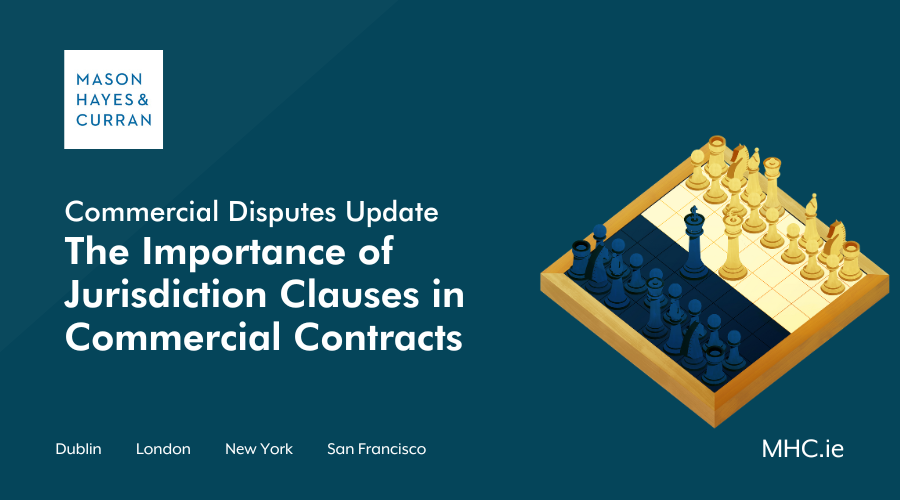The Importance of Jurisdiction Clauses in Commercial Contracts

The High Court recently decided on the validity of jurisdiction clauses in two separate contracts. One clause provided for the courts of Italy to have exclusive jurisdiction over any contractual disputes, the other gave exclusive jurisdiction to the courts of Bosnia. Companies, which often engage in cross-border collaborations and transactions, must pay close attention to this decision. James Morrin, Commercial Disputes partner, discusses this decision.
The case[1]
concerned a contractual dispute between Monetizead D.O.O (M), Techads Media Limited (T) and Schugnizerria Consulting Limited (S). M is a company incorporated in Bosnia and Herzegovina. T and S are Irish registered companies and for the purpose of the dispute the parties agreed T and S were domiciled in Ireland.
Background
M entered into a contract with T (the T Agreement) whereby M would drive website traffic to websites belonging to T. The T Agreement provided that “Any suit or proceeding arising out of or relating to this Agreement will be commenced in an Italian court”. M then separately subcontracted S to provide some of this traffic (the S Agreement). The S Agreement provided that “Any suit or proceeding arising out of or relating to this Agreement will be commenced in a Bosnian court”.
T subsequently terminated its agreement with M, claiming that it had been provided with bad website traffic. M denied that the web traffic was bad and claimed that the termination of the contract by T amounted to a breach of contract. M sought damages of over USD $3.8m from T for this breach.
M also claimed that any bad traffic sent to T was caused by S and claimed approximately €500,000 of damages from S for breaching its agreement with M.
Both T and S argued that, because of the jurisdiction clauses, the Irish High Court did not have jurisdiction to hear the dispute.
Jurisdiction clauses and the Brussels Recast Regulation
Article 4 of Regulation (EU) Number 1215/2012 (the Brussels Recast Regulation) provides that a company must be sued in the Member State in which it is domiciled i.e. the default position is that an Irish registered company must be sued in Ireland. This is subject to the derogation in Article 25 of the Brussels Recast Regulation which provides that parties may agree that the courts of another Member State will have exclusive jurisdiction to hear disputes arising in connection with a particular legal relationship. Article 25 is silent regarding the effect of an exclusive jurisdiction clause in favour of a non-EU Member State.
Mr Justice Twomey held that the Article 25 derogation did not apply to the jurisdiction clause in the S Agreement since Bosnia is not an EU Member State. As such, the court held that Article 4 still applied, and the Irish court therefore had jurisdiction to hear M’s claim against S because S was domiciled in Ireland. The court held that Article 4 was prescriptive in stating that a defendant “shall” be sued in the country in which they are domiciled and that this overrules the freedom of the parties to agree otherwise, except as provided by in the Brussels Recast Regulation.
Conclusion
Commercial parties contracting for the supply of goods and services across borders should pay careful attention to the jurisdiction clauses in contracts they are party to. Parties should also be aware at the contractual negotiation stage with parties in other EU Member States that, should a dispute arise and there is no jurisdiction clause in their contract, then the default position under the Brussels Recast Regulation is that they must sue the other party in the foreign EU jurisdiction in which that party is domiciled. This could lead to unforeseen difficulties, such as additional costs, delays and practical difficulties.
There can be significant advantages to agreeing that the Irish courts should have jurisdiction to hear contractual disputes. These include the fact that Ireland is a common law, English-speaking jurisdiction and because judgements obtained in Ireland are automatically enforceable in other EU Member States.
People also ask
| What is a jurisdiction clause? |
A jurisdiction clause is a clause in a contract which states which country’s courts will determine disputes arising out of the contract. |
For more information or expert advice on all related matters, contact a member of our Dispute Resolution team.
The content of this article is provided for information purposes only and does not constitute legal or other advice.
[1] Monetizead D.O.O v Techads Media Limited and Schugnizerria Consulting Limited
Share this:


